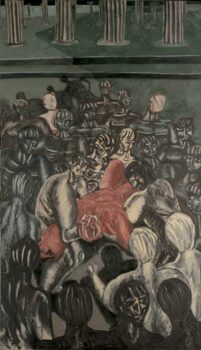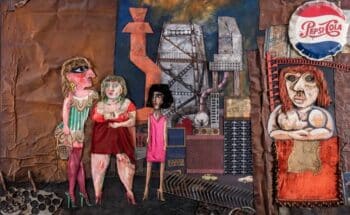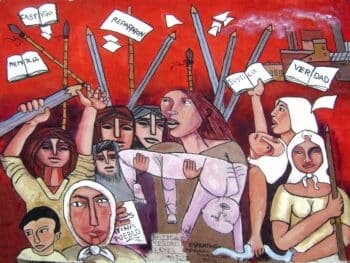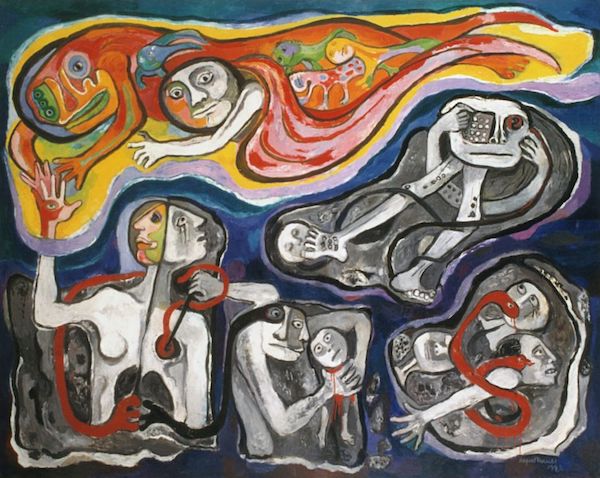Dear friends,
Greetings from the desk of Tricontinental: Institute for Social Research.

Duilio Pierri (Argentina), Retorno de los restos (‘Return of the Remains’), 1987.
Chaos reigns in the United Kingdom, where the prime minister’s residence in London – 10 Downing Street – prepares for the entry of Rishi Sunak, one of the richest men in the country. Liz Truss remained in office for a mere 45 days, convulsed as her government was by a cycle of workers’ strikes and the mediocrity of her policies. In her mini budget, which doomed her government, Truss opted for a full-scale neoliberal assault on the British public with both tax cuts and unacknowledged cuts to social benefits. The policies startled the international financial class, whose political role emerged clearly as wealthy bondholders indicated their loss of faith in the UK by junking government bonds, thereby increasing the cost of government borrowing and raising the mortgage payments for homeowners. It was this wealthy bondholder class that acted as the real opposition to the Truss government. Even the International Monetary Fund (IMF) weighed in with a strong statement, saying that ‘the nature of the UK measures will likely increase inequality’.
What is stunning here is the IMF’s worry about increased inequality. Over the IMF’s seventy-eight-year history, since it was founded in 1944, the fund has rarely paid attention to the phenomenon of increased inequality. In fact, in large part due to its policies, most of the countries of the Global South are stuck in an ‘austerity trap’, which was shaped by the following processes:
- Old colonial histories of plunder meant that the new nations of the post-World War II era had to borrow money from their former colonial rulers.
- Borrowing this money to build key infrastructure that was not built during colonial times meant that the loans were sunk into long-term projects that did not pay for themselves.
- Most of these countries were forced to borrow more money to settle the interest payment on the loans, which resulted in the Third World Debt Crisis of the 1980s.
- The IMF used Structural Adjustment Programmes to enforce austerity within these countries as a condition of being able to borrow to pay off the loans. Austerity impoverished billions of people, whose labour continued to be drawn into cycles of accumulation and was used – often very productively – to enrich the few at the expense of the many who poured their sweat into the global commodity chain.
- A poorer population meant less social wealth in the countries of the Global South, despite increased industrialisation, and this lowered social wealth alongside the plunder of resources meant that there was both less surplus to improve the public’s conditions of life and that these countries’ governments had to pay higher rates to borrow money to pay off their debts. That is why from 1980, the countries of the Global South saw an outflow of public funds to the tune of $4.2 trillion to pay for the interest on their loans. Further compounding this plunder is the fact that an additional $16.3 trillion left the countries of the Global South from 1980 to 2016 through trade misinvoicing and mispricing as well as leakages in the balance of payments and recorded financial transfers.

Antonio Berni (Argentina), Ramona espera (‘Ramona Waits’), 1964.
The ugly detritus of this process of the Global South’s routine impoverishment is documented in detail in our dossier no. 57, The Geopolitics of Inequality: Discussing Pathways Towards a More Just World (October 2022). The dossier, produced by our office in Buenos Aires based on a detailed analysis of the available data sets, shows that whereas inequality is a global phenomenon, the deeper cuts in livelihood are experienced in the countries of the Global South. For example, the dossier recounts that ‘in the world’s 163 countries, only 32% of households have incomes above the global average. Of this total, only a few countries in the periphery have above average incomes, while 100% of the core countries are above the average’.
This ‘geopolitics of inequality’ persists, even though industrial production has moved from the Global North to the Global South. Industrialisation in the context of the global division of labour and the global ownership of intellectual property rights means that while countries in the Global South house industrial production, they do not receive the gains from this production. ‘A paradigmatic case is that of the region of North Africa and the Middle East, which represents 185% of the manufacturing output of the North but only accounts for 15% of the per capita income of rich countries,’ the dossier notes. Furthermore, ‘[t]he Global South produces 26% more manufactured goods than the North but accounts for 80% less income per capita’.

Nora Patrich and Carlos Sessano (Argentina), Historia, verdad, leyes (‘History, Truth, Laws’), 2012.
Industrialisation is taking place in the Global South, but ‘the centres of global capitalism still control the productive process and the monetary capital that allow the initiation of cycles of productive accumulation’. These forms of control over the capitalist system (industry and finance) lead to the ceaseless increase of the wealth of billionaires (such as the UK’s new prime minister, Rishi Sunak) alongside the pauperisation of the many, most of whom live in poverty no matter how hard or how much they work. During the early years of pandemic, for instance, ‘a new billionaire appeared every 26 hours, while the incomes of 99% of the population declined’.
In the interest of building a pathway towards a more just world, our dossier’s analysis of the reproduction of inequality closes with a five-point plan. These points are an invitation to a dialogue.
- The partial disconnection of global chains. Here, we call for new trade and development regimes that see greater South-South participation and greater regionalism rather than being bound to global commodity chains that are anchored by the needs of the Global North.
- The appropriation of revenue by the state. The state’s concrete intervention through taxation (or nationalisation) in appropriating revenue (such as land rents as well as mining and technological revenues) is key to reducing the ruling class’s income growth.
- The taxation of speculative capital. Large volumes of capital flee the countries of the Global South, which cannot be captured unless there are capital controls or taxes on speculative capital.
- The nationalisation of strategic goods and services. Key sectors of the economies of the Global South have been privatised and purchased by global finance capital, which expatriate profits and make decisions about these sectors based on their interests and not those of the workers.
- The taxation of corporate and individual windfall profits. Firms’ astronomical profits are largely put into speculation rather than production or towards raising the incomes and quality of life of the majority. Imposing a tax on super profits would be a step towards closing this gap.

Baya Mahieddine (Algeria), Woman and Peacock, 1973.
Almost fifty years ago, the countries of the Global South, organised by the Non-Aligned Movement (NAM) and the G77, drafted a resolution called the New International Economic Order (NIEO) and won its passage at the UN General Assembly on 1 May 1974. The NIEO articulated a vision for trade and development that did not rely upon the Global South’s dependency on the Global North, with specific proposals around science and technology transfer, the creation of a new global monetary system, the maintenance of import substitution, cartelisation, and other strategies to enhance food sovereignty and earn higher prices for raw material sales, as well as greater South-South cooperation.
Many of the proposals outlined in our dossier and refined for our era are drawn from the NIEO. Algeria’s president, Houari Boumédiène, pushed the NIEO at the 1973 NAM meeting in Algiers. The year after the resolution passed at the UN, Boumédiène argued that the world was gripped by the ‘dialectic of domination and plundering on the one hand, and the dialectic of emancipation and recovery on the other’. If the NIEO did not pass and if the Global North refused to transfer the ‘control and use of the fruits of resources belonging to the countries of the Third World’, Boumédiène said that an ‘uncontrollable conflagration’ would result. However, rather than permit the NIEO to be established, the West drove a policy that created the Third World Debt Crisis, leading to the ‘austerity trap’ on the one hand and the anti-IMF riots on the other. History, since then, has not advanced.
In 1979, Tanzania’s President Julius Nyerere said in the aftermath of the death of the NIEO and the birth of the Third World Debt Crisis that there was a need to create a ‘Trade Union of the Poor’. Such a political unity did not emerge at that time, nor is there any such ‘trade union’ in our time. Its construction is a necessity.
Warmly,
Vijay

